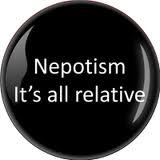Nepotism: Good or Bad?
Jul 31,2015
Intro
Some of you might not know what Nepotism is. Wikipedia defines it as, "favoritism granted to relatives." The origin of the the concept comes from the Italian word "nepotsimo", which is based on Latin root nepos meaning nephew. During the late 17th century, some Catholic Popes and Bishops who had no legitimate offspring of their own, due to their having taken a vow of chastity, gave their nephews preference over others for appointed positions. Sometimes these nephews would elevate all the way to cardinalate. Often such appointments were a means of continuing a papal "dynasty".
Nepotism Today
Nepotism in today's society can be seen in every type of business imaginable. This is present in ever city and country in the world today. Nepotism in the workplace can mean increased job opportunities and promotions over similarly situated people. Arguments can be made both for and against employment granted due to family connection. On the one hand, nepotism can provide stability and continuity. However, critics cite studies that demonstrate decreased morale and commitment from non-related employees. Forbes magazine states, "There is no ladder to climb when the top rung is reserved for people with a certain name." Some businesses actually forbid nepotism as an ethical matter, considering it too troublesome and disruptive.
Personal Benefits
Separating from the family business is a great way to test your own competence. There will be fewer whispers that you got the job by your connections alone, and little fear that you will enter an organization with a sense of family entitlement. It also ensures you don't wind up doing a job that doesn't interest you simply because it was easy to land. Scott Livengood, chief executive of Krispy Kreme during the chain's nearly fourfold expansion cited this as the main reason he wouldn't want his sons following him into the business.
Fiduciary Duty
Some people may wonder how much banning nepotism may benefit it's company. While it's clearly important to avoid what Jones calls the "feckless nephew" phenomenon, appointing an incompetent or lazy relative to a prominent position-at public and private companies alike. However, it would be easier to trust someone into your company quicker if they are a family member and not a stranger off the street. On the other hand, research shows profitability dropping by the double digits when a company is handed down from one generation to the next.
Testimonials
John Maxfield, a writer for The Motley Fool, believes not all nepotism at public companies is beyond the pale, but that hiring practices must pass two tests. For one thing, he said, "Companies must not substitute familial bonds for otherwise necessary expertise or qualifications." In other words, the person you're hiring needs to have the skills for the job, regardless of whether she's the chief executive's niece or not. Also, Maxfield said, pay should be appropriate for the job being done. Companies shouldn't pad the pockets of the executive's family at the expense of shareholders."
Conclusion
While most experts agree that it is important to avoid nepotism at the workplace, they also see the value in acknowledging that many people get jobs based on connections. If we stop pretending that the the world is a pure meritocracy, we can put more energy into making sure a wider range of people get the extra leg up provided to others by powerful family members. I think we can all agree that this is what needs to be done in order to put the right people in the right positions; regardless of age, race, religion, or background. It can also be seen that no matter who you are; the son of a father who wants you to follow in his footsteps or the kid who wants that same job desperately, taking nepotism out of hiring could create a large amount of increased happiness in the world today.
References:
1. Jacobs, Rose. "Nepotism On The Job: The Good, The Bad, and The Ugly." Forbes, 1 Oct. 2014. Web. 31 July 2015.
2."Nepotism." Wikipedia, 31 July 2015. Web. 31 July 2015.






